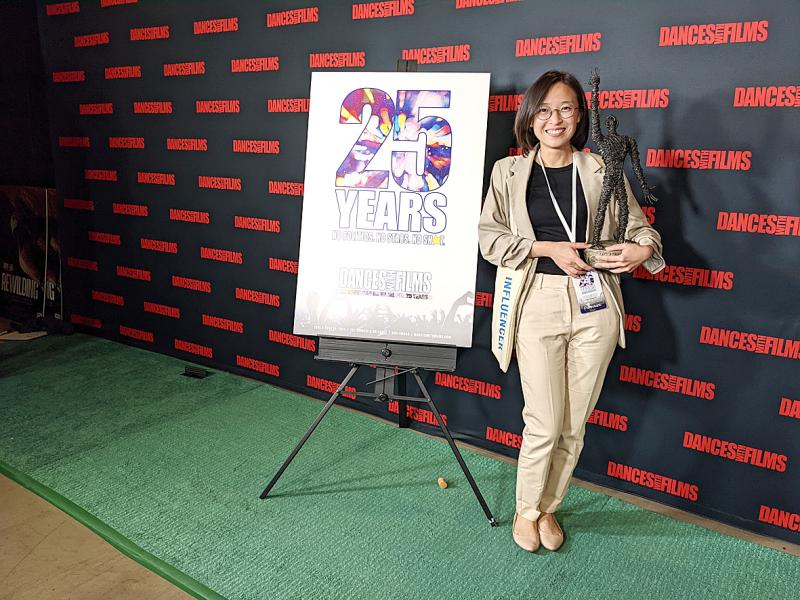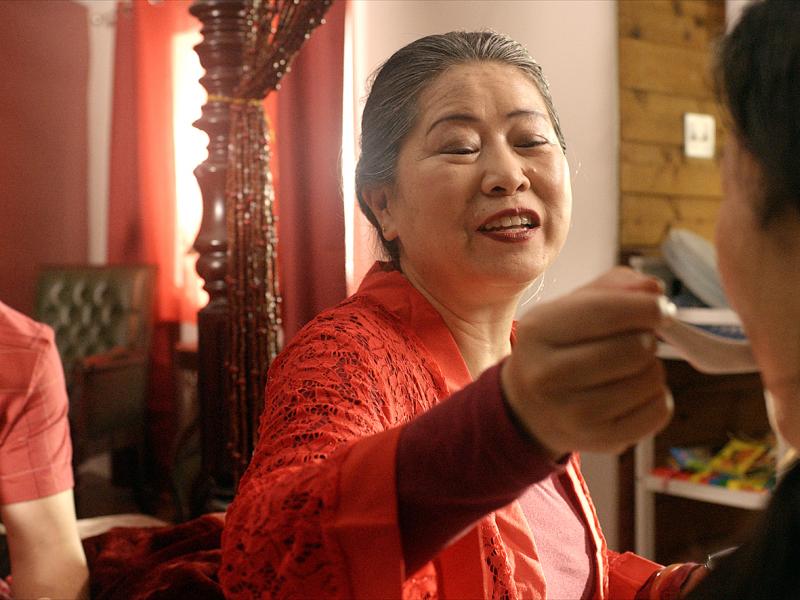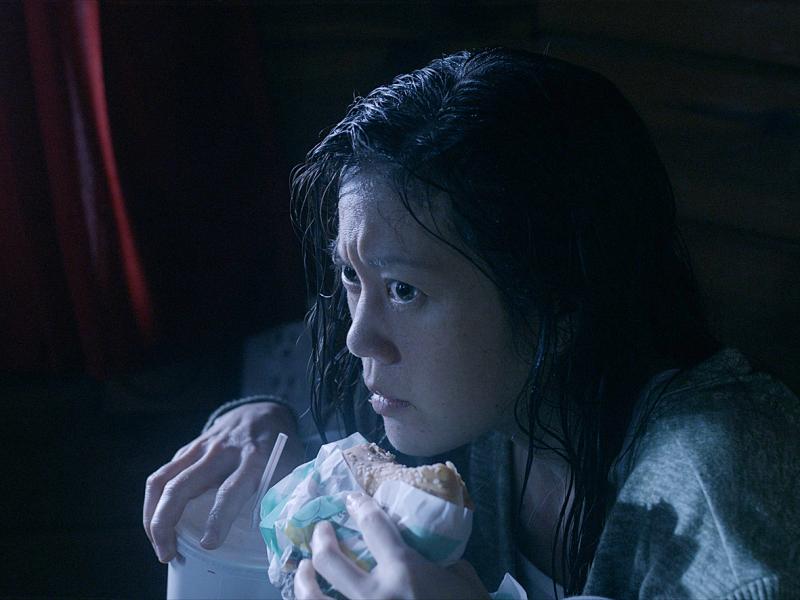In the short film A Dire Strait, Taiwanese-American protagonist Demi is confined to her bed, forced to eat the same food everyday and forbidden to shower. She even has to urinate in a jar, and her nightmare begins when she tries to secretly resist the rules.
This “dark comedy/thriller” is actually about a ritual that most postpartum Taiwanese and Chinese women still partake in: zuoyuezi (坐月子, sitting for one month), which is meant to help their “broken” bodies recover and produce the best quality milk for their newborn. Demi’s captors are her in-laws, whose round-the-clock surveillance is driving her mad.
US-based Taiwanese director Lin Liang-chun (林亮君) says that while the film features the strictest version of the tradition and is partially based on what her mother went through, she’s found that many younger mothers still go through similar restrictions. The COVID-19 pandemic’s quarantine measures also served as inspiration, as more people are now able to empathize with the zuoyuezi experience of isolation.

Photo courtesy of Lin Liang-chun
“The confinement element of zuoyuezi is actually very suitable for a thriller film,” Lin says. “But the nature of the genre requires me to portray the most extreme version of the practice. I tell people at screenings that not every family is like this, and this is not an anti-zuoyuezi movie.”
However, the cultural standards of being a “good mother” and the pressure “to prioritize family over self-care while also doing it in a ‘right’ way that pleases elders” is real, and still passed down through each generation by women who endured it themselves, Lin says.
A Dire Strait won the Grand Jury Award for shorts at last month’s annual Dances With Films festival in Los Angeles for independent productions, and Lin hopes to show it at upcoming cinema events in Taiwan.

Photo courtesy of Lin Liang-chun
LITTLE KNOWN PRACTICE
Lin says her mother frequently talked about her painful zuoyuezi experience. She had to sneak food into her room, and although it was the sweltering Taiwanese summer, she had to wear a sweater and was forbidden from using a fan or even opening the window even after she developed a severe heat rash.
While many American viewers have never heard of the practice, Lin found that Taiwanese and Chinese mothers in the US often go through stricter experiences than their counterparts in Asia.

Photo courtesy of Lin Liang-chun
“Since immigrants are afraid of losing their culture and roots, they try even harder to preserve them,” Lin says. “Many mothers and mothers-in-law here are way more traditional than the ones in Taiwan.”
Plus, women in Taiwan can go to postpartum centers where there’s significantly less pressure, but these facilities are very expensive and rare in the US, so it’s more common for the parents to carry out the practice. Lin hopes to go beyond the more common Asian-American topics and present more of these lesser-known cultural issues to Western audiences.
The film also contains subtle references to cross-strait politics, especially with the title: the in-laws wear red, the husband, who mostly goes along with his parents, is clad in blue, while Demi appears in green.
“So far, only Taiwanese and Chinese have been able to pick up on this, while Americans not so much,” Lin says. “But it doesn’t matter, the most important thing is to tell a good, character-driven story. The conflict between collectivists and individualists naturally occurs in that family.”
MOTHER’S AWAKENING
A Dire Strait is also a shout-out to Lin’s mother, who began pursuing her own path after decades as the “good daughter-in-law.”
When she was nearly 60 years old, Peng Su-hua (彭素華) enrolled in the Graduate Institute of Children’s Literature at National Taitung University and began hanging out with women more than half her age.
“It took my mom, the most talented woman I know, 30 years to find out what she wanted to do with her life other than being a mother,” Lin says.
Lin’s next project is a feature-length film based on Peng’s latest novel, Grandmas’ Bikini (奶奶們的比基尼), which was published last year. It tells the story of four grandmas who embark on a road trip after one of them is diagnosed with a cyst in her breast that needs to be removed.
“They decide to go to the beach and wear bikinis to celebrate their bodies,” Lin says. “They bring an annoying granddaughter along, and the story is told from her perspective.”
Although it’s a humorous story, Lin found herself in tears as she leafed through the pages, as she saw bits of her mother in each of the grandmas.
“I knew that the story symbolized her feminist awakening process,” she says. “These grandmas breaking free of family pressure and searching for themselves totally symbolizes my mother’s journey of self-discovery.”

US President Donald Trump may have hoped for an impromptu talk with his old friend Kim Jong-un during a recent trip to Asia, but analysts say the increasingly emboldened North Korean despot had few good reasons to join the photo-op. Trump sent repeated overtures to Kim during his barnstorming tour of Asia, saying he was “100 percent” open to a meeting and even bucking decades of US policy by conceding that North Korea was “sort of a nuclear power.” But Pyongyang kept mum on the invitation, instead firing off missiles and sending its foreign minister to Russia and Belarus, with whom it

When Taiwan was battered by storms this summer, the only crumb of comfort I could take was knowing that some advice I’d drafted several weeks earlier had been correct. Regarding the Southern Cross-Island Highway (南橫公路), a spectacular high-elevation route connecting Taiwan’s southwest with the country’s southeast, I’d written: “The precarious existence of this road cannot be overstated; those hoping to drive or ride all the way across should have a backup plan.” As this article was going to press, the middle section of the highway, between Meishankou (梅山口) in Kaohsiung and Siangyang (向陽) in Taitung County, was still closed to outsiders

President William Lai (賴清德) has championed Taiwan as an “AI Island” — an artificial intelligence (AI) hub powering the global tech economy. But without major shifts in talent, funding and strategic direction, this vision risks becoming a static fortress: indispensable, yet immobile and vulnerable. It’s time to reframe Taiwan’s ambition. Time to move from a resource-rich AI island to an AI Armada. Why change metaphors? Because choosing the right metaphor shapes both understanding and strategy. The “AI Island” frames our national ambition as a static fortress that, while valuable, is still vulnerable and reactive. Shifting our metaphor to an “AI Armada”

The Chinese Communist Party (CCP) has a dystopian, radical and dangerous conception of itself. Few are aware of this very fundamental difference between how they view power and how the rest of the world does. Even those of us who have lived in China sometimes fall back into the trap of viewing it through the lens of the power relationships common throughout the rest of the world, instead of understanding the CCP as it conceives of itself. Broadly speaking, the concepts of the people, race, culture, civilization, nation, government and religion are separate, though often overlapping and intertwined. A government